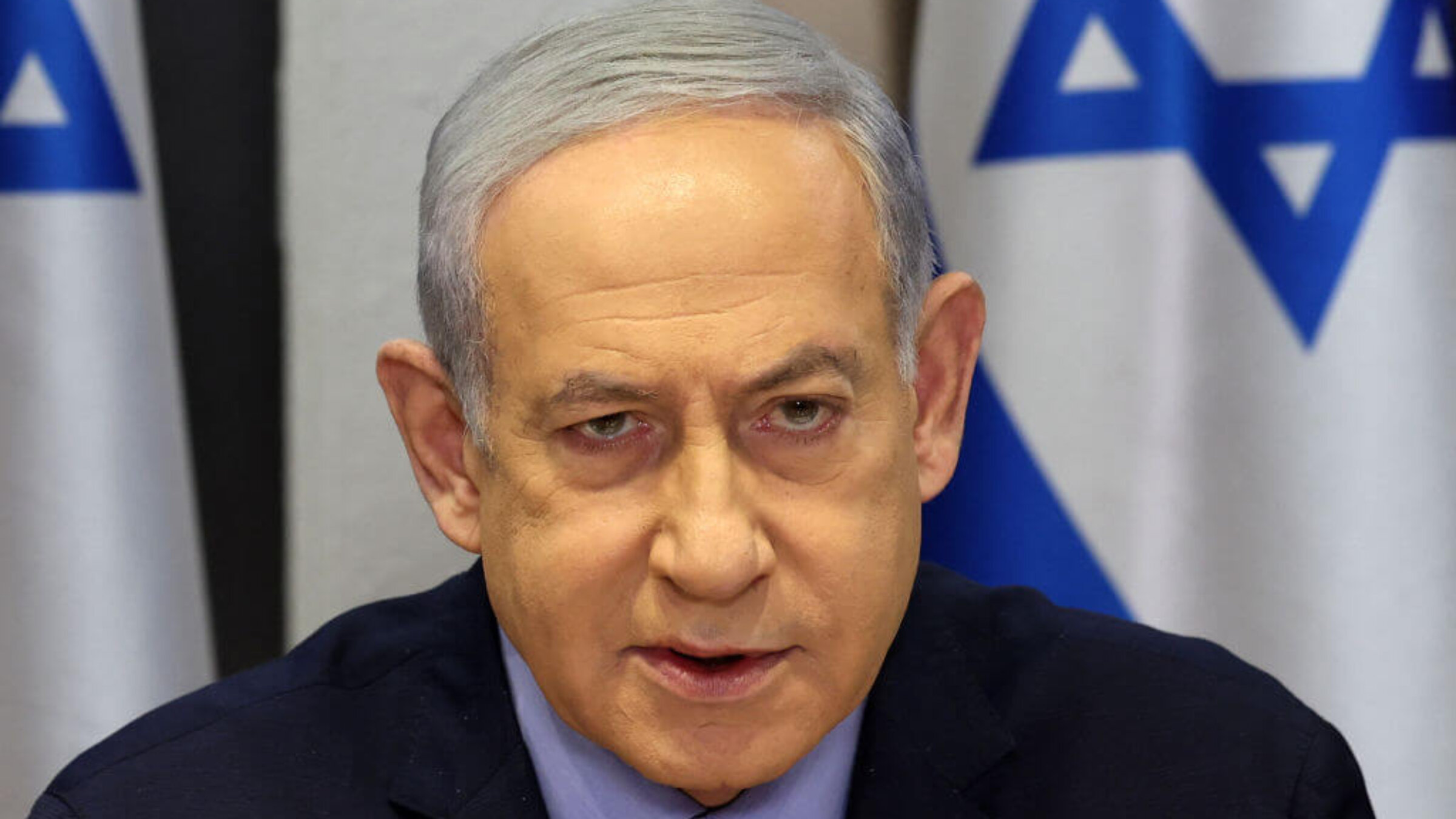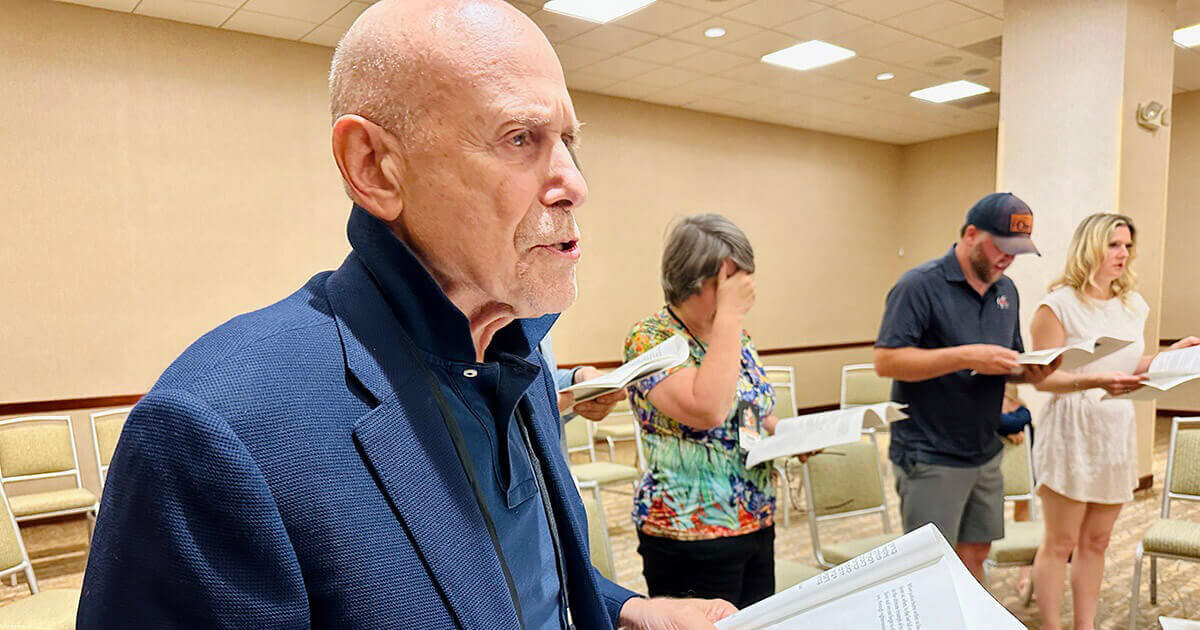Analysis: Caught by surprise on Oct. 7, Netanyahu looks to preserve his power post-war
Israel’s prime minister is determined to lead the country during the war and after it ends

Israeli Prime Minister Benjamin Netanyahu on Dec. 31. Photo by Abir Sultan/Pool/AFP via Getty Images
War has delayed what many Israelis predict will be a day of reckoning for Israeli Prime Minister Benjamin Netanyahu.
A majority hold him at least partially responsible for the significant security lapses that made it far easier for Hamas to attack southern Israel on Oct. 7. And while few are willing to change leaders while battalions of young Israelis continue to fight in Gaza, and while Hamas continues to launch rockets toward Israeli cities, his political future appears precarious.
A recent poll showed that only 15% of Israelis, including 36% of those who had previously voted for his Likud Party, want to see Netanyahu stay on as prime minister after the war. A similar poll showed that 71% of Israelis, including 45% of those who voted for the Likud ruling party, think Netanyahu must resign immediately after the end of the military campaign in Gaza.
Those who have worked for Netanyahu — he is Israel’s longest-tenured prime minister, having served for more than 17 years as the country’s leader — or studied him closely can’t envision him resigning voluntarily. To his critics, he simply craves power. More charitable views explain Netanyahu, the son of historian Benzion Netanyahu, as a man who sees himself as the great protector of the Jewish state, a responsibility he feels he cannot abdicate.
But some imagine scenarios in which he is forced out of power.

In one, mass protests led by bereaved families and IDF reservists make it clear that the country is not behind him. In another, at least five members of his governing coalition join an effort to oust him and establish a new government. Or the first scenario triggers the second.
Netanyahu could relieve — at least temporarily — pressures to resign by calling for an early election. That gives him at least another six months in power — the time it takes to prepare for and hold an election, and swear in a new government.
To delay all of that, Netanyahu can try to maintain the status quo, in which Israelis are united behind a war to eliminate Hamas and the return the hostages. “The only thing that I plan to get rid of is Hamas,” Netanyahu told reporters in Tel Aviv on Saturday when asked if he planned to step down once the military campaign in Gaza is over.
But Netanyahu, 74, is clearly thinking of his post-war prospects, and preparing to protect them. As his critics have pointed out, he has already used the bully pulpit — prime-time press conferences and public appearances — to test what sound like campaign slogans.
To assess how likely and how long Netanyahu will continue to lead Israel I spoke with a dozen Israeli commentators and experts, including some of Netanyahu’s biographers. A few said they wouldn’t publicly share their view while the military campaign in Gaza continues. The rest maintained that Netanyahu will do everything he can to hold on to power.
‘Bibi is a fighter’
Netanyahu has rehabilitated his reputation before.
Mazal Mualem, a political commentator and author of Cracking the Netanyahu Code, recalled Netanyahu’s diminished appeal after a right-wing extremist assassinated Prime Minister Yitzhak Rabin in 1995.
According to a classified cable later published by WikiLeaks, former U.S. Ambassador to Israel Martin Indyk reported at the time that Netanyahu, then the leader of the Likud Party and the opposition, said Rabin’s death was a “disaster for the right which will be decimated if elections are called soon.”
Netanyahu had up to that point led Rabin in opinion polls, thanks to right-wing anger over Rabin’s support of the U.S.-brokered Oslo Accords. But after his death, Netanyahu’s standing fell, as many Israelis blamed him for fomenting fears that the country was not safe with Rabin in power. Even some right-wing Knesset members saw Netanyahu as a liability and considered replacing him. Yet, eight months later, Netanyahu was elected as prime minister.

“Bibi is a fighter,” she said, using Netanyahu’s nickname. “He never surrenders.”
Mualem suggested that Netanyahu may be able to stage a similar comeback in the months to come. With time, she said, responsibility for failing to prevent the Oct. 7 attacks may be spread thinner, and not rest so squarely on Netanyahu’s shoulders. Focus, she said, would shift to the entire intelligence and defense establishment, and attacks against him in particular might paradoxically help rally his political base.
“Netanyahu knows that people have a short memory,” said Shalom Lipner, a nonresident senior fellow of the Middle East program at the Atlantic Council. Between 1990 to 2016, Lipner served seven consecutive prime ministers. Netanyahu believes if he plays his political cards just right, and appeals to the public just so, he could rehabilitate himself, Lipner said.
In her book, Mualem writes that people close to Netanyahu have noted his love of action movies in which heroes overcome steep odds to defeat villains. “Netanyahu never rests,” she writes. “He is goal-oriented, constantly absorbing information, engaging in battles of wit with real or imagined enemies, concocting creative operations, lulling his opponents, digging burrows and outflanking them. He is a master of cruel and deadly political campaigns, going to extremes, and even beyond.”
But Mualem said Netanyahu is also a realist. He will remain in the political arena only as long as he sees himself as a viable candidate. If he concludes otherwise, she said, he could well opt for early elections but decide not to run to spare himself defeat.
Anshel Pfeffer, another Netanyahu biographer, predicts that he will not be able to live down Oct. 7. Netanyahu was the one who led Israel before it faced its darkest day in decades, said Pfeffer. the author of Bibi: The Turbulent Life and Times of Benjamin Netanyahu.
“The verdict of history about Netanyahu was written and that cannot be erased anymore,” he said. “He will be forever remembered as Israel’s worst leader.”
Waging war, playing politics
Some commentators see Netanyahu deftly shaping his wartime strategy and rhetoric to strengthen his political base, which has backed him despite his ongoing corruption trial.
Tal Shalev, a political reporter for Walla News!, an Israeli news site, said Netanyahu’s refusal to discuss Biden’s proposal for a revitalized Palestinian Authority to replace Hamas in Gaza is one way in which he is trying to “redefine the lines between left and right” that have blurred as the country unifies in war.
“I won’t allow Hamastan to be replaced by Fatahstan,” is a slogan he has repeated recently in public remarks, referring to the most dominant political party in the West Bank.

This stance appeals to right-wing Israelis who make up Netanyahu’s base, and distinguishes him from Benny Gantz, the centrist leader of the National Unity Camp. But it’s likely to play well beyond his base as well: A Hebrew University poll published last month showed only 11% of Israelis support the return of the Palestinian Authority to Gaza.
But Netanyahu also seems to understand that he can’t snub Biden too obviously. The president has won the hearts of Israelis for his emotional outpouring of support for the country in the wake of Oct. 7, and his refusal to bend to calls for a cease-fire from even moderate members of his party. He doesn’t want to risk support from Israel’s strongest ally.
To that end Netanyahu has taken steps to temper the extremist right wing of his party, excluding them from a war cabinet. And he has reportedly met privately with Likud members, arguing that only he has the credibility to confront an American president and oppose a Palestinian state.
And to fend off challenges from within his party, Netanyahu has offered some potential rebels key diplomatic positions abroad. There are at least five Likud members who are already being viewed as potential defectors, including Defense Minister Yoav Gallant, who has a rocky relationship with Netanyahu, and Yuli Edelstein, former Knesset Speaker and chair of the foreign affairs and security committee.
The day after
Netanyahu was sworn in for his sixth term as prime minister in January. In the months that followed, hundreds of thousands of Israelis took to the streets to denounce his plan for a judicial overhaul, which they said would eviscerate Israeli democracy to concentrate power in Likud lawmakers. Those weekly protests, which made headlines around the world and drew the support of many American Jews, stopped after Oct. 7 as the country unified in war. Last week, Israel’s Supreme Court struck down a key part of his overhaul plan that limited some of the power of the high court. Reactions from both sides were muted.
But over the past few weeks, anti-Netanyahu protests — though relatively tiny — have been taking place again. Hundreds of demonstrators gathered last Saturday night in Tel Aviv holding “elections now” banners to demonstrate against the government’s handling of the ongoing war and the failure to secure the release of the remaining 133 hostages from Gaza.
Those protests are expected to grow as the war effort winds down. Gantz has indicated that he won’t remain in the cabinet once the war is over, which could refocus blame on Netanyahu as the party responsible for the mistakes of past weeks — from the failure to prevent the attack to the friendly fire killings of three hostages.
Tamar Hermann, a senior research fellow at the Israel Democracy Institute, referencing one of the institute’s recent public opinion surveys, said many Israelis are still waiting for Netanyahu to take responsibility for anything. “This is something that people find more difficult to live with,” she said.
A message from our Publisher & CEO Rachel Fishman Feddersen

I hope you appreciated this article. Before you go, I’d like to ask you to please support the Forward’s award-winning, nonprofit journalism so that we can be prepared for whatever news 2025 brings.
At a time when other newsrooms are closing or cutting back, the Forward has removed its paywall and invested additional resources to report on the ground from Israel and around the U.S. on the impact of the war, rising antisemitism and polarized discourse.
Readers like you make it all possible. Support our work by becoming a Forward Member and connect with our journalism and your community.
— Rachel Fishman Feddersen, Publisher and CEO





























